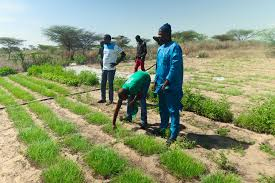Agriculture is the backbone of many African economies, providing employment, food, and income for millions of people. However, the sector faces numerous challenges, including low productivity, limited access to markets, and inadequate technology adoption. Extension services play a vital role in addressing these challenges and promoting agricultural development in Africa.
What are Extension Services?
Extension services refer to the provision of technical assistance, training, and advisory services to farmers, pastoralists, and other agricultural stakeholders. These services aim to improve agricultural productivity, enhance livelihoods, and promote sustainable agricultural practices. Extension services can be delivered by government agencies, non-governmental organizations (NGOs), private sector companies, and community-based organizations.
Key Roles of Extension Services
- Technology Transfer: Extension services provide farmers with access to improved agricultural technologies, such as high-yielding crop varieties, disease-resistant livestock breeds, and conservation agriculture practices.
- Capacity Building: Extension services train farmers on new skills and knowledge, enabling them to adopt and manage improved agricultural practices.
- Advisory Services: Extension agents provide farmers with advice on crop and animal management, soil conservation, pest and disease management, and marketing.
- Market Linkages: Extension services can facilitate linkages between farmers and markets, enabling them to access better prices and improve their incomes.
- Farmer Empowerment: Extension services empower farmers to make informed decisions about their agricultural practices, enhancing their autonomy and self-reliance.
Benefits of Extension Services
- Increased Productivity: Extension services can lead to increased crop yields and livestock productivity, improving food security and incomes.
- Improved Livelihoods: By enhancing agricultural productivity and incomes, extension services can contribute to improved livelihoods and poverty reduction.
- Sustainable Agriculture: Extension services can promote sustainable agricultural practices, such as conservation agriculture and integrated pest management, which enhance environmental sustainability.
- Empowered Farmers: Extension services can empower farmers to make informed decisions about their agricultural practices, enhancing their autonomy and self-reliance.
Challenges Facing Extension Services in Africa
- Limited Funding: Extension services often face limited funding, which constrains their ability to deliver effective services.
- Inadequate Infrastructure: Poor infrastructure, such as roads and communication networks, can limit access to extension services.
- Limited Capacity: Extension agents may lack the necessary skills and knowledge to deliver effective services.
- Top-Down Approach: Extension services are often delivered using a top-down approach, which may not account for farmers’ needs and priorities.
Innovative Approaches to Extension Services
- ICT-Based Extension: Information and communication technologies (ICTs), such as mobile phones and tablets, can enhance access to extension services and improve their effectiveness.
- Farmer-to-Farmer Extension: Farmer-to-farmer extension approaches, where trained farmers provide extension services to their peers, can be an effective way to reach more farmers.
- Public-Private Partnerships: Public-private partnerships can leverage resources and expertise from the private sector to enhance the delivery of extension services.
- Participatory Approaches: Participatory approaches, which involve farmers in the design and delivery of extension services, can ensure that services are responsive to farmers’ needs and priorities.
Conclusion
Extension services play a vital role in promoting agricultural development in Africa. By providing technical assistance, training, and advisory services, extension services can enhance agricultural productivity, improve livelihoods, and promote sustainable agriculture. However, extension services face numerous challenges, including limited funding, inadequate infrastructure, and limited capacity. Innovative approaches, such as ICT-based extension, farmer-to-farmer extension, public-private partnerships, and participatory approaches, can enhance the effectiveness of extension services. As Africa continues to face agricultural development challenges, the role of extension services will remain critical in promoting sustainable agricultural growth and improving the lives of millions of farmers and their families

